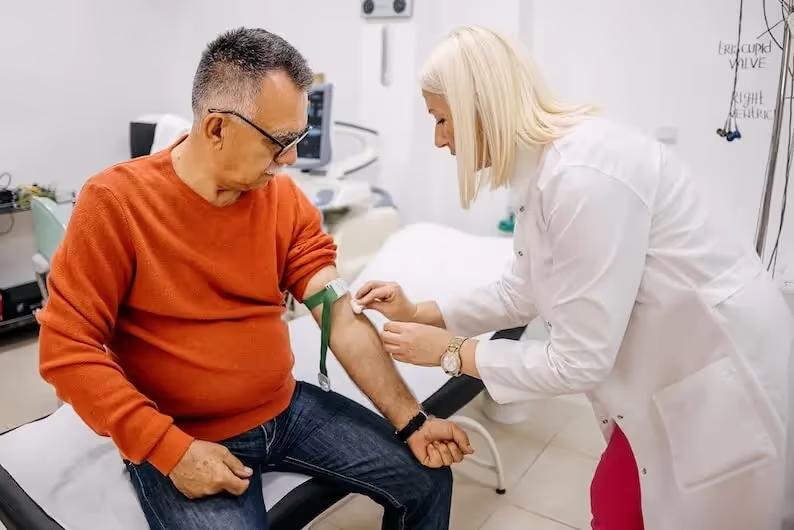Regular health screenings are essential for everyone, but they become increasingly important as we age. For seniors, early detection and preventative care can make a significant difference in managing chronic conditions and catching potential health issues before they become serious. Here's a guide to the top exams and screenings every senior should consider for optimal health.
Blood Pressure Screening
Why it's Important: High blood pressure, or hypertension, is a silent condition with few noticeable symptoms. Left untreated, it can lead to serious complications such as heart disease, stroke, and kidney damage. Nearly half of adults in the U.S. have high blood pressure, making it a vital screening for seniors. Recommendation: Seniors should have their blood pressure checked at least once a year or more frequently if it's elevated or they have risk factors for cardiovascular disease.
Cholesterol Screening
Why it's Important: High cholesterol levels can lead to the buildup of plaques in the arteries, increasing the risk of heart attack and stroke. Many people with high cholesterol aren't aware of it, as it often presents without symptoms. Recommendation: For seniors, cholesterol levels should be tested every year or more frequently if they have heart disease, diabetes, or other risk factors.
Bone Density Test
Why it's Important: Osteoporosis is common in older adults, especially postmenopausal women. A bone density test measures the strength of your bones, helping detect osteoporosis early and reducing the risk of fractures. Recommendation: Women over 65 and men over 70 should have a bone density test every two years, though those with additional risk factors may benefit from more frequent screenings.
Colorectal Cancer Screening
Why it's Important: Colorectal cancer is one of the most common cancers among older adults, but it is also one of the most preventable. Early screening allows doctors to detect and remove polyps before they become cancerous. Recommendation: Seniors should begin screening for colorectal cancer at age 50 and continue until age 75, or as recommended by their physician. Options include a colonoscopy every 10 years, a stool test annually, or a CT colonography every five years.
Vision Exam
Why it's Important: Age-related eye diseases, such as macular degeneration, glaucoma, and cataracts, are common among seniors and can lead to vision impairment or blindness if untreated. Recommendation: It's recommended that seniors have an eye exam every one to two years, especially if they have diabetes or a family history of eye diseases.
Hearing Test
Why it's Important: Hearing loss affects many older adults and can lead to social isolation, depression, and even cognitive decline if not addressed. Recommendation: A baseline hearing test is recommended at age 65, with follow-ups every one to two years depending on hearing health and personal risk factors.
Diabetes Screening
Why it's Important: Type 2 diabetes is more prevalent in older adults and can lead to severe complications, including kidney disease, nerve damage, and vision problems, if untreated. Recommendation: Seniors should have a fasting blood glucose or A1C test every three years starting at age 45, though those with risk factors or a family history may require annual screenings.
Skin Cancer Screening
Why it's Important: Skin cancer is one of the most common cancers, particularly in people with a history of prolonged sun exposure. Regular screenings can detect skin cancer in its early stages when it's most treatable. Recommendation: Seniors should have a full-body skin examination by a dermatologist annually or as often as their doctor recommends based on skin type and risk factors.
Mammogram and Breast Exam
Why it's Important: Breast cancer risk increases with age, and regular screenings help catch it early when it's most treatable. Recommendation: Women should have a mammogram every year, though those with a family history or genetic predisposition may benefit from earlier or more frequent testing. Women 55 and older can switch to a mammogram every other year or continue with yearly mammograms based on their overall health and risks.
Prostate Cancer Screening
Why it's Important: Prostate cancer is one of the most common cancers in men, particularly those over 65. Early detection can make a significant difference in treatment outcomes. Recommendation: Men over 50 should discuss prostate cancer screening with their doctor. The screening may involve a prostate-specific antigen (PSA) blood test, and frequency varies based on individual risk factors.
Dental Exam
Why it's Important: Oral health can affect overall health, and poor dental hygiene can lead to infections, heart disease, and complications in managing diabetes. Recommendation: Seniors should visit the dentist every six months for a cleaning and check-up. Those with gum disease may need more frequent visits.
Schedule an Appointment with a VIPcare Provider Today!
Don't wait to take control of your health—schedule a wellness visit with a VIPcare provider today and find out what health screenings you need. Our senior-focused approach ensures you receive the personalized screenings and preventative care you need to stay ahead of potential health concerns. Schedule your appointment now!




